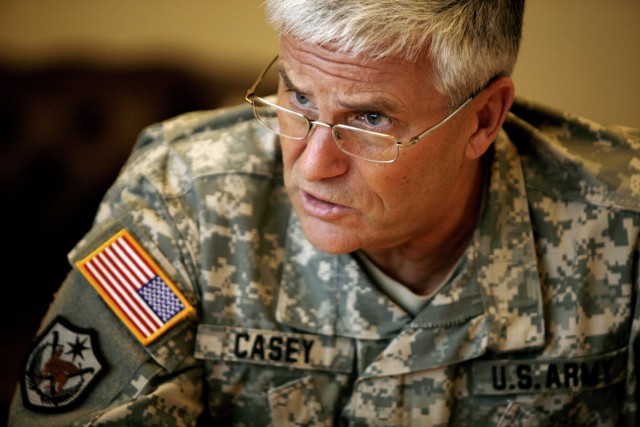FORT LEWIS, Wash. - The Army has made great strides, said Gen. George W. Casey Jr., since he first visited Fort Lewis in his current capacity as chief of staff. In part as a result of feedback he received here 18 months ago from Soldiers and family members, the Army instituted programs that have helped alleviate some of its burdens and attack its challenges.
Casey came to the Northwest Nov. 1 to assess I Corps training progress and attend the after-action review for Unified Endeavor, the exercise that certified the America's Corps headquarters to assume its mission as Multi-national Corps-Iraq.
The tone was very different than his April 27, 2007, visit. Combat tours for the 3rd and 4th brigades of the 2nd Infantry Division had just been extended for surge operations. Two weeks into his tenure as chief, the Army was stressed.
"Right after I got here, it was clear to us that the Army was out of balance," Casey said of his 2007 visit. "I was hearing at the time that the Army was broken and ... hollow and that was clearly not true ... But what I saw was that we were deploying at a rate that was clearly unsustainable for this all-volunteer force. And it wasn't allowing us sufficient time at home to build the capabilities and flexibility that we needed to do the other things besides regular warfare."
Keys to rebalancing the force, Casey said, were President Bush's decision to roll back tour lengths to 12 months and the Army's success in growing the force.
In an open forum in Carey Theater in April 2007 and sessions like it, Casey spoke of the Army's intentions to increase its numbers by 2012. He realized from Soldiers' reactions that the pace of recruiting and retention needed to increase.
"When I was out here talking to Soldiers, I said, 'Yes, we're going to grow the Army and we're going to be done by 2012,' and the look on the faces (in front of me) was like, 'You've got to be kidding me.' Frankly I went back (to Department of the Army) and I said, 'Hey, we need to do this faster."
Army planners accelerated that growth to 2010, and with current recruiting and retention efforts, Casey said they may reach their goals even faster.
"Last year almost 290,000 men and women enlisted or re-enlisted in the Army, Guard and Reserve," Casey said. "That's a huge number. And every one of them enlisted fully understanding that in all likelihood they would go to combat. Now that is a population that the United States of America can be proud of and is proud of."
He said he is often moved by anecdotes about the burden the operations tempo was placing on Army family members.
"I'm an Army brat, 60 years an Army family (member)," he said. "My dad deployed back and forth a couple times to Vietnam and didn't come back the last time. So I understand the stresses and strains these deployments put on families."
Casey said the Army Family Covenant has helped "restate our partnership and commitment to families." Programs continue to roll out on behalf of family members.
"Not only did we issue this covenant, we doubled the amount of money we're putting toward family programs," Casey said. "I just had a session with family members at the Association of the United States Army with my wife. And it was clear we're starting to see the positive effects of the covenant. I've told my staff that (2009) is the year we really deliver on the effects of the covenant. We're committed to that, and we're not backing off."
Casey said he often carries those stories of Army families' sacrifices back to his staff. They have helped retool Army priorities. Last year, those priorities turned into a new four-year plan focused on four objectives Casey termed "imperatives" that include sustaining Soldiers and families, preparing Soldiers for success in the current conflict, resetting units effectively and transforming the force for an uncertain future.
Casey particularly thanked the Soldiers and families who are veterans of multiple deployments and bring the experience that is helping to accomplish missions in complex, confusing environments. Their sacrifices and resolve, he said, have turned the tide of the current conflict.
"(Today's Army) is indeed the most resilient, professional, seasoned force I've been associated with in the 38 years I've been in the Army."
Don Kramer is a reporter with Fort Lewis' Northwest Guardian.


Social Sharing